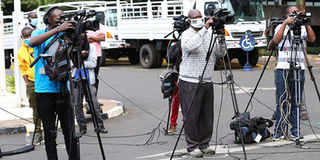Journalism doesn’t always have to have a point; it is the point

Journalists covering the coronavirus daily briefing at Afya House in Nairobi on April 19, 2020. PHOTO | FILE | NATION MEDIA GROUP
What you need to know:
- Journalism is not a good place for illiterate people; it requires an ability to assimilate large amounts of information, make fast logical connections and detect suspicious discontinuities.
- Journalism is good for obsessive personalities, the type who can go after something with total absorption and commitment for months.
There is no profession with as many quacks and counterfeits as journalism.
Fake journalists are everywhere. They are in government, in NGOs, in the academy — they are all over the place. This comes from the belief that anyone can be a journalist; that you don’t need any special skill, so long as you can “write”.
As we celebrate World Press Freedom Day, on Sunday, I will take the liberty to reflect on journalism and the quacks who sully its face.
The purpose of a column is not always to break news or to provide new, groundbreaking information. Sometimes a good column is a break, for the reader and the writer, from serious business.
Many times people have the wrong expectations; they expect every piece of journalism to be a seminal examination of a serious issue.
This is common among (I will not say academic pukes, which is the phrase that comes unbidden to mind) our friends in universities who expect each piece of journalism to contain the blueprint for the novel coronavirus vaccine or some such other serious enterprise.
There is a difference between an academic thesis and journalism, and that is why journalism doesn’t always have to have a point: it is the point.
My favourite columnist is Jeremy Clarkson. I don’t think I have learnt anything new from him and I find most of his opinions outrageous.
WHAT IS JOURNALISM?
But I would not advise anyone to read only Clarkson; it may be wise to mix the serious writers with a smattering of other pukes if you want to learn something new.
There is a secret ingredient to great writing and I’ll describe it like this: it is the Latin guitar in Madonna’s “La Isla Bonita”, more likely to bring a lump to your throat than all the pain in the world and as glorious a surprise as the harmonica in Tina Turner’s “What’s Love Got to Do with It”; the smoky voice, the wild hair, the endless legs, the pink-lipped pout, the stage strut … how does all this prepare you for that sound?
But I digress. I was brought into journalism by Taifa Leo. My father used to buy both the Daily Nation and Taifa. I suspect that both of us struggled a little with all that Philip Ochieng English in the Nation and Taifa was an easier read.
The story was about Cuba and Fidel Castro, which would have appealed to my father, who, I think, was a Marxist.
Who is a journalist? Well, in general, lawyers don’t make good journalists. They are verbose and get taken in by their own cleverness — journalism is the science of accurate simplification and lawyers have a difficult time finding “voice”.
Don’t get me wrong: there are lawyers who are also great writers. Makau Mutua — when he writes well — and Betty Murungi have an Ernest Hemingway aftertaste: a beautiful, clean, natural, spare precision. And it is not just linguistic competence; it comes from a place of intellectual clarity and decency.
SIXTH SENSE
You will never be much of a journalist if you don’t have an inborn sense of justice, the courage to be unpopular and disliked and an instinctive willingness to gravitate towards the defence of the underdog.
You must love people, have a great sense of community and a willingness to fight lost causes, make sacrifices without expectation of reward and throw your own interests down the toilet for the benefit of people who many times despise you.
Great journalists are not pragmatic; they have a naïve, almost suicidal, belief in the truth and integrity.
In a society such as Kenya, which is a lake of cynicism, filth, corruption and malice, it takes moral strength not to give up or attack some rent-a-mouth Twitter gorilla and accept that you are honest because that is how you choose to be and not so that your honesty is recognised, praised and earns you honour.
In this twisted society, the heroes are the thieves, pornographers, malicious delinquents and extortionists; these are the ones we look up to for value judgements.
Journalism is not a good place for illiterate people; it requires an ability to assimilate large amounts of information, make fast logical connections and detect suspicious discontinuities.
VALUES
It comes off as “nose for news” or sixth sense for lies. Nearly every person who comes up to you has a concocted story; you have to spot it quickly and put it out of its misery.
Journalism is good for obsessive personalities, the type who can go after something with total absorption and commitment for months.
I remember a team of photographer and reporter who covered the social scene and, for years every day, you would meet them briskly criss-crossing the city from function to function in the middle of the night, drinking soda and munching through an endless supply of nuts.
It’s a different society today and I presume it calls for a different set of skills but not — I hope — values.
Happy World Press Freedom Day, friends.





